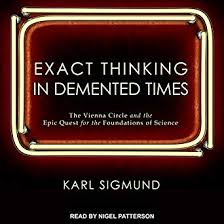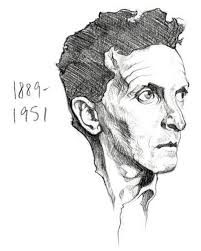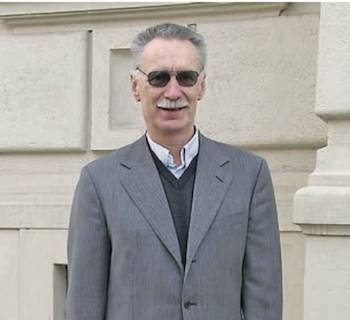GoodReads meta-data is 480 pages, rated 4.17 by 107 litizens.
Genre: Non-Fiction.

Verdict: Only for the cognoscenti.
The Wiener Kreis was one of the engines of Twentieth Century science, including philosophy and mathematics. It began as a loose discussion group and evolved into a more tightly knit and organised group with satellites. The Kreis – Circle – waxed and waned with the circumstances and fortunes of its members until reality kicked in the door in 1938.
Those associated with it comprised a Who’s Who of intellect, e.g., Albert Einstein, Kurt Gödel, Hans Reichenbach, Carl Hempel, Ludwig Wittgenstein, Otto Neurath, Rudolf Carnap, Richard von Mises, Karl Menger, Moritz Schlick, Ernst Mach, and more. Chaps all if it has to be said. Bertrand Russell and other English-speaking intellectuals beat a path to its door. As a whole the Kreis published monographs and the journal ‘Erkenntnis’ (Knowledge). Springer continues to publish it to this day.
Its members together offered logical empiricism though many preferred to say logical positivism, because the empiricism was made of air. It was the big bang that created analytic philosophy that dominated English-speaking philosophy in the Twentieth Century. Its exemplars include A. J. Ayer, Hans Kelsen, Karl Popper, Willard Quine, Frank Ramsay, and Lord Russell himself and all who followed his star.
They were united in a holus bolus rejection of metaphysics and often suspected one another of just that tendency. Some of the descriptions of seminars sound rather like Communist Party cell self-criticism sessions. Of course, there were many intellectual differences among the members. This book also gives weight to their personal and social similarities and differences. Many were Jewish and that made life increasing difficult for them and those around them in Mitteleuropa.
Many of these folk were oddballs, indeed, but the Emperor of Strange had to be Ludwig Wittgenstein who has sometimes been worshipped as a saint in philosophy and at other time derogated as the selfish malcontent that he was. Whoops, my objectivity slipped on that one.

Heir to a vast fortune, he lived like a vagrant. Some find that admirable. He was perhaps born to be a stylite. (Look it up.) He did not use the fortune to any good purpose and in time much of it was seized by the Naziis for their purposes. Even so he always had money available though he seldom spent it.
When acolytes appealed to him for financial help, he dismissed them on the ground that poverty was ennobling. Thanks, Ludi, they all said with a smile. Some of these appeals came from very desperate people, sometimes Jews who had been his students, in the 1930s. There is no record that he ever did anything to help another person. This saint attended only his own soul. He also managed to ruin the careers of more than one acolyte, but that is too complicated to explain here.
The times were indeed demented as illustrated in the case of one of the more sober and sane members, Moritz Schlick, who ran the show for years. A disaffected student blamed Schlick for all his woes and festered on this belief for years, sending him threatening letters, stalking him, accosting him on the street. The forbearing Schlick endured this burden for some time until finally he reported it to the police. Once the police became involved the student blamed Schlick even more for his troubles.
Now get this. The student got a gun and tried to shoot Schlick. He bungled it and was arrested, founded insane, and locked up….for eighteen months when he was released. Got another gun, and tried again. Another bungle. Arrested again. Locked up again. Released again. Got another gun, and third time successful. If that reads like a bad plot, sit down, because it gets worse.
The murderer was tried and sentenced but by this time time no one cared. He served a few years in a prison and then was released whereupon he became an ardent Nazi and later served as a guard in a death camp for Jews. After the war he was whitewashed, as were so many Austrians. In Germany a German with that record would have been barred from public service. Not so in Austria. (Indeed some Germans relocated to Austria because of that difference.)
He became a post-war bureaucrat, prospered, and retired on a state pension. When a biographer of Schlick wrote that he had been murdered by a deranged student without giving his name, the murderer sued for libel and won. It sound like something that Fox News would do today. The dead victim became of the villain and the villain became the victim!
One of the most attractive figures in the constellation of the Vienna Circle was Otto Neurath, and we pay tribute to him most days. Go to a public men’s room and on the door is a pictograph representing a man. Pointing the way to the train station is a picture of a train engine, not a letter T. A sign indicating a traffic turning-lane shows a car over a curved arrow. Look at the pictorial icons on the smartphone screen. These are downwind traces of Big Otto. Having given up on Esperanto, he tried to create a pictograph language with 800 words and a grammar of isotypes. Big Otto worked closely with his wife Marie on this. She was one of the few woman around the Circle. His personal and often repeated motto was ‘We must improvise.’ The more so they did when on the run from the Naziis.
While these thinkers argued to the death over protocol sentences and other esoteria, the world around them caught fire and took some of them completely by surprise, while others had seen it coming and fled. They spread the seed of logical positivism far and wide in the English-speaking world, though at the end of the war Austria did not want them back. Rather it preferred to appoint and promote people like Schlick’s murderer. The example is the effort made to block Kurt Gödel’s return to Vienna. Grotesque but true. Austrian university authorities went to great lengths to insure he did not return to Vienna. Yet every mathematician in the world — apart from those in Austria — regarded him as THE Genius of the ages.
 Karl Sigmund near the building where the circlers circled.
Karl Sigmund near the building where the circlers circled.
I went to Grad School because I wanted to study Plato and Aristotle and their kind. Instead, I got ‘Language, Truth, and Logic’ and other such tomes. Through five years of graduate work I never did read Plato for a seminar. But Ayer, Russell, Popper, Hemple, Quine, and [see above]. Looking back on it, it was a form of discipline, rather like learning a dead language (Latin or Greek), in which form triumphed over content, process over product. It was a time when philosophers and hence we cousins in political theory were trying to be scientific.
The PhD was the hardest thing I have ever done. The coursework was hard. The oral exams were hard. Writing the dissertation was hard. The defence was hard. It was all hard. It’s been downhill since!
I listened to this book on Audible and found it entertaining though some of the expositions were hard to follow. The reading is most accomplished. The difficulty was following the abstract and abstruse thoughts without seeing the words.
Skip to content
